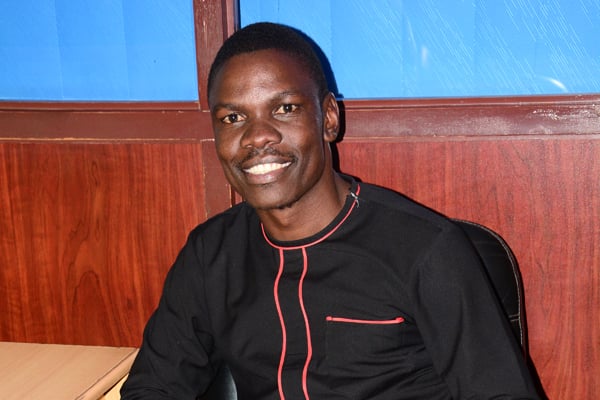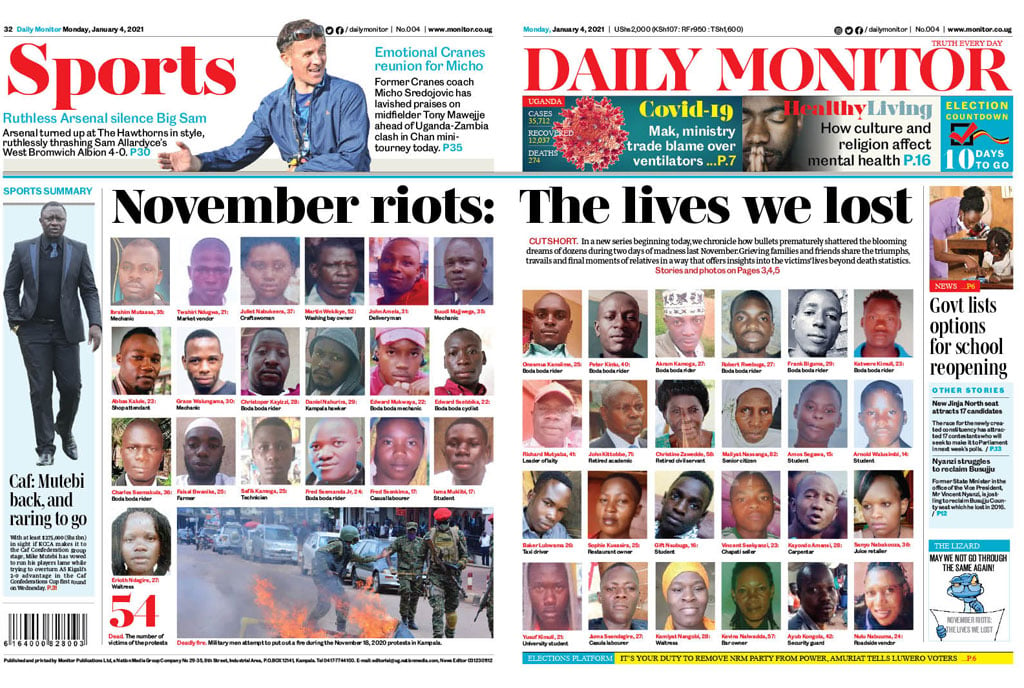Prime
November riots report: Stray bullets killed 39 victims

Cover page of Daily Monitor newspaper on January 4, 2021 showing faces of some of the people who died during clashes between civilians and security forces in Kampala in November 2020. PHOTO/FILE
What you need to know:
- None of the security personnel who took lives of unarmed citizens has been arrested or tried.
A report of an internal government investigations into the 2020 November riot killings has revealed that 39 out of the 54, or 72 percent, of people shot dead were hit by “stray bullets”.
Police Criminal Investigations Director, AIGP Grace Akullo, prepared the report and transmitted it to the Inspector General of Police, Mr Martins Okoth-Ochola, on December 5, 2020.
Whereas the government shared a copy of the report with diplomats representing countries that are members of the United Nations Security Council, the findings were kept secret from Ugandans until this newspaper began serialising the report last Monday to mark one-year anniversary of the protests.
Only eight of those shot dead were “rioters”, according to the investigations, contrary to earlier briefings to President Museveni who during a televised address on November 29 said 32 individuals shot dead by security forces were “rioters”.
The December 5 police reports indicates that Local Defence Unit personnel shot dead two victims, one being a colleague while a car which careered after the driver was distracted by stone-hurling protestors, smashed a bystander.
The figures of the dead in the police report add to 50, leaving four fatalities unaccounted four.
Violent protests erupted in Kampala and other major towns on November 18, 2020 following the arrest of then National Unity Platform (NUP) presidential flag bearer Robert Kyagulanyi, alias Bobi Wine, in the eastern Luuka District, ostensibly for violating measures put in place by the Ministry of Health to prevent the spread of Covid-19 during the campaigns.
Subduing the three-day protest necessitated insertion of elements of the Special Forces, Uganda’s elite military unit, who had distinguished themselves fighting the Allied Democratic Forces and al-Shabaab in the DR Congo and Somalia, respectively, according to President Museveni.
Whereas the report shows arrests and prosecutions of dozens of suspected rioters on offences ranging from holding unlawful assembly, malicious destruction of property, causing damage to roads and doing negligent act likely to cause spread of an infectious disease, none of the security personnel who took lives of unarmed citizens has been arrested or tried.
Mr Charles Twine, the CID spokesperson, yesterday declined to comment on the demand for accountability for the lives lost during the November riots.
“I am not at liberty to comment about that matter. The last time you wrote the story, your [staff] were called to our offices in regard to that matter. So, I am not going to comment about it and you know why you are writing the story,” he said.
The CID spokesperson was referring to the summoning by police of the Nation Media Group-Uganda (NMG-U) Managing Director, Mr Tony Glencross, and the NMG-U Managing Editor, Mr Tabu Butagira, whom police grilled for four hours on June 24 over this newspaper’s publications of findings of British Broadcasting Corporation (BBC) investigation into the November riot killings.
Police preferred holding charges of incitement to violence and promoting sectarianism against Mr Butagira, whom one of the police detectives, during interrogation, threatened could be “killed or stoned” on the streets when not wearing NTV uniform.
Violent protests erupted in Kampala, the Ugandan capital, and other major cities when police seized the then National Unity Platform (NUP) party presidential candidate Robert Kyagulanyi, alias Bobi Wine, in the eastern Luuka District on allegation of violating Covid-19 guidelines in November last year.
In the aftermath of the killings, President Museveni demanded for an audit into what he called the phenomenon of killings attributed to stray bullets.
“Police should audit the issue of killing people by stray bullets. What was the original purpose of the bullets that strayed? ... Even if you don’t have anti-riot equipment, you can ably control a riotous situation while firing in the air. With firing in the air, there can’t be stray bullets,” he said.
It is unclear if the audit was contacted, but the President’s similar orders to prosecute security personnel culpable in the November 2020 shootings as well as making the findings of the investigations into the incident public, are yet to be complied with.
Mr Museveni’s promise that his government would compensate for lives and property of innocent victims of the violent protests has not been fulfilled a year later and Attorney General Kiryowa Kiwanuka, in an interview on November 14, this year, said his office is evaluating claims by families of about half-a-dozen victims.
“When a person complains, we get details of their case and the person makes their claim. There is a process that is currently ongoing to see that these people are compensated which is part of the justice that they deserve,” he said then.
Many relatives told this newspaper that they were bounced from one government office to another, including police, in their search for justice and compensation.
Mr Suubi Kiwanuka, the deputy executive director of Uganda Media Centre, said yesterday that the investigations into the matter are slow, but progressing.
“When we were called about this [demand for accountability] last time, we reached out to our different agencies and they informed us that the investigations are on, but it was hard to identify the shooters of the stray bullets. You know a bullet moves in a long-distance at a short time. It would be hard to tell from which gun it [the bullet] has come from,” he said.
In April this year, Ms Hajara Nakitto, a businesswoman and the mother of a 15-year-old Amos Ssegawa, struck dead near Clock Tower in Kampala by a bullet allegedly fired by a soldier, sued the government demanding, among others, “substantial compensation”. The case is pending hearing.
In an interview last night, Dr Livingston Ssewanyana, a human rights lawyer, said the best option is to make a combined legal claim against the government to ensure that all victims get justice and compensation as promised by President Museveni.
“We have already seen that one person has gone to court and nothing has been done. That is another window, but the other is to make a cluster claim and continue demanding for the same as a basic law principle,” he added.
Last week, a group of human rights defenders under their umbrella body dubbed Network of Public Interest Lawyers, released a statement indicating that they would sue the government if nothing is done for the victims of the November riots by end of next month.





